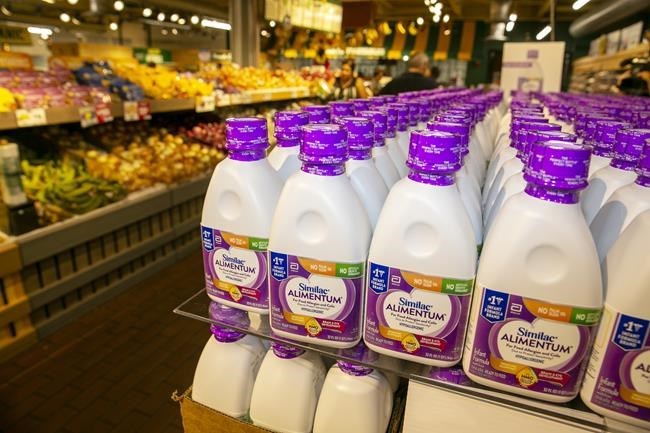OTTAWA — The federal government is looking for ways to bring more infant formula products to Canada while it overhauls regulations to prevent future shortages, an internal memo shows.
Many parents still struggle to find the right formula for their babies at a reasonable price, after last year's temporary shutdown of a U.S.-based manufacturing plant caused a major shortage of shipments to Canada.
The bare shelves illustrated just how fragile Canada's supply chain is when it comes to vital infant formula, which Canada does not produce domestically.
The government is expected to reveal its long-term plans to deal with the problem this fall as part of an overhaul of outdated rules that govern how Canada approves infant formula products.
Those changes could take years, though, so the government is considering a stopgap that would see the health minister exempt products from certain requirements.
"This would allow harmonization with other jurisdictions before the comprehensive regulatory amendments are completed, so that manufacturers can produce the same bulk product for Canada as for other jurisdictions," staff said in a heavily redacted memo to the deputy health minister in April.
In other words, companies wouldn't have to work as hard to tailor their products to Canada's rules, which might entice them to sell here.
The memo was obtained by The Canadian Press through the Access to Information Act.
The department plans to spend 2024 figuring out which rules have become unnecessary barriers that should be exempted. Staff hope removing those barriers will increase the number of products in the Canadian market.
Health Canada also aims to continue to prioritize applications for new infant formula products and production sites.
Food, Health & Consumer Products of Canada has called for major reforms to the rules, which the industry group's representatives suggest are too strict and lead to long waits for new product approvals.
According to the federal memo, Health Canada is expecting strong support for its new plan in the fall, which it anticipates will "incentivize foreign manufacturers to sell their products in the Canadian market without having to wait."
The department also expects that parents will be relieved to see the government work toward a more stable supply of products.
Details of the reforms that will be included in that plan have been redacted, and Health Canada did not directly respond to questions about the proposed stopgap measure.
"Health Canada continues to explore longer term solutions, including forthcoming regulatory modernization options that could reduce barriers to market access and increase importation and domestic production," the department said in a statement Monday.
The formula supply has stabilized in Canada as of August, Health Canada said, and the demand is being met with the help of imports from the United States and Europe.
Still, costs are rapidly increasing.
The average price of a 900-gram tub of infant formula increased 12.7 per cent between February and June this year, from $34.34 to $38.70, Statistics Canada data show.
For now, Health Canada and the Canadian Food Inspection Agency have relaxed the enforcement of some rules to allow for the import of roughly 70 products from countries with similar standards until Dec. 31, 2024.
This report by The Canadian Press was first published Aug. 28, 2023.
Laura Osman, The Canadian Press



